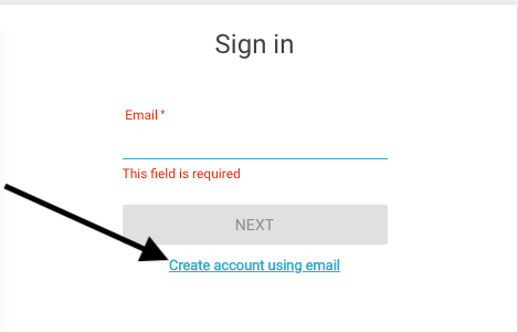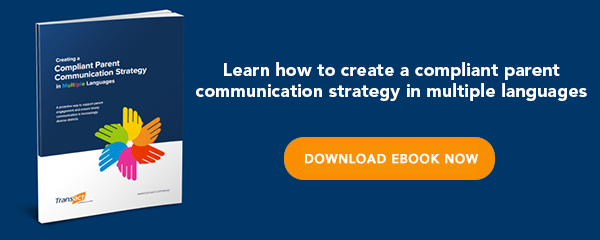In this blog post, you will find everything related to TransACT's ParentNotices and our ESSA ParentNotices Collection. Find all of the monthly updates below:
2023
2022
Update Equitable Services Guidance Released
In May 2023, the U.S. Department of Education (USED) released updated guidance, “Providing Equitable Services to Eligible Private School Children, Teachers, and Families”. This guidance, which was originally released in October 2019, includes information about:
- Consultation with Private School Officials
- Allocating funds for equitable services
- Delivery of equitable services
- Program evaluation and modification
- The state private schools ombudsman
- The handling of complaints
Requirements to document consultation with Private School Officials are included in the Every Student Succeeds Act (ESSA). The ESSA ParentNotices Collection includes four documents that help districts to record consultation with Private School Officials, the decisions made during the consultation, and other important decisions and information. Retaining documentation of consultation with Private School Officials is important for proving compliance during a federal monitoring visit.
Updates to ESSA Required EL Notification to Parents
TransACT ParentNotices has updated its ESSA-required notification to Parents of ELs regarding identification as an English learner (EL) and placement of their student in an EL program. The document, English Learner Program Placement, is available in both the ESSA Collection and the General Education Collection.
It is an ESSA-required notification, which means it is one that the law says must be sent to the parents of ELs. The ESSA requirements are extensive, covering a whole page in the law, Section 1112(e)(3)(A)(i-viii).
English Learner Program Placement Document Updates
Updates to the document, English Learner Program Placement, include the following:
- Since 90% of U.S. States participate in one of two English language proficiency (ELP) assessment consortia, we added a check box option to choose which ELP assessment was administered
- Proficiency levels for the domains assessed, listening, speaking, reading, and writing, were added individually so that individual domain scores can be provided along with a composite score for all four domains
- Also included is the potential to provide a proficiency level for Literacy, which is a combination of the reading and writing domains
- Since ESSA requires that academic assessment data also be provided if available, the updated document includes expanded reporting for academic assessment proficiency for the English language arts, math, and science assessments; and an “other” assessment if needed
Addressing Each State's Entrance and Exit Criteria
States may have different entrance and exit criteria for determining which students fall into the EL subgroup. Adding proficiency levels for separate domains, a literacy proficiency level, and a composite proficiency level allows educators to include all the data associated with their State's entrance and exit criteria.
If a measure is not needed or is unavailable, it can be left blank, or the words “does not apply” can be added. Using “N/A” in any of these blanks is not recommended since the parents of ELs may not understand what “N/A” is an abbreviation for.
Stay Tuned for More Information
In the near future, TransACT will be adding the capability of uploading assessment data that can be used to autofill the proficiency level scores. Stay tuned for more information or email support@transact.com for further details.
Updates to the Self-Onboarding Feature in ParentNotices
TransACT ParentNotices launched the self-onboarding feature in July of last year. Since then, hundreds of educators have signed up for a ParentNotices account using the self-onboarding link available on the ParentNotices sign-in page: www.parentnotices.com/login.
When the self-onboarding feature was launched, it required a local education agency (LEA) review process by an existing LEA ParentNotices account holder to approve the new account request.
GOOD NEWS: The self-onboarding feature has been updated to eliminate the LEA review process. If someone with a valid LEA email domain already has an account, the educator requesting an account using the self-onboarding feature will be automatically approved.
Self-onboarding allows staff without a ParentNotices account to create an account using a valid LEA email address. To create an account, simply click on the “Create account using email” link on the sign-in page, enter your LEA email address, and complete the form. Only valid LEA email addresses are recognized. Please only use your district or school email address, not your personal email.

Once the self-onboarding request is complete and submitted, the educator should receive an email with instructions on logging in. A review process will still be needed for LEAs where no one has created an account using a valid LEA email address. In these cases, email support@transact.com for assistance.
For more information or to request assistance with your ParentNotices account, please contact support@transact.com or call 425-977-2100, Option 3.
Required ESSA Notification for Statewide Family Engagement Centers
The Every Student Succeeds Act (ESSA) includes, under Title IV, Part E grants from the U.S. Department of Education (USED) directly to entities to establish Statewide Family Engagement Centers.
These centers provide parent education programs and family engagement in education programs or provide comprehensive training and technical assistance to:
- State education agencies (SEAs)
- Local education agencies (LEAs – Districts and Charter Schools)
- Other organizations that provide these programs
Grants to establish Statewide Family Engagement Centers are not awarded to states by USED; they are awarded directly to the entity that operates the center. The awards are typically five-year awards, averaging about $1 million annually. Some awards are lower but generally no less than about $600,000 annually. It is important to note that the funding provided for this program is insufficient to establish centers in all states. There have been 20 grants awarded over the past five years.
Family Engagement in Education Program Requirements and Notices
Title I, Section 1116(g) requires LEAs in states where a Statewide Family Engagement Center is in operation to notify parents and organizations that work with parents and families of the existence of the center. Title I calls these centers "Family Engagement in Education Programs".
TransACT's ESSA ParentNotices Collection includes the notice "PFE-10 - Programs for Family Engagement in Education" to notify parents and organizations that a Statewide Family Engagement Center is operating in the state. This notice includes information about the activities of Statewide Family Engagement Centers and the center's contact information.
States with Statewide Family Engagement Centers in Operation
Nineteen states have Statewide Family Engagement Centers in operation. The complete list of grantees, their applications, and grant amounts is available on the USED website. If your district is in one of these states, it must notify parents regarding the Statewide Family Engagement Center in operation in your state.
The states with Statewide Family Engagement Centers in operation are Alaska, Arkansas, Arizona, Colorado, Connecticut, Hawaii, Kentucky, Maine, Maryland, Massachusetts, Minnesota, Nebraska, New Hampshire, Ohio, Pennsylvania, South Carolina, South Dakota, Washington, and West Virginia.
Updates to Tribal Consultation and Private School Consultation Notices: Title VI, Part F – Project SERV Grants
TransACT ParentNotices continually seeks to make improvements to its notifications, tools, and user interface—frequently at the request of our customers. Earlier in 2022, one of our state customers pointed out that we lacked documents to assist with and document the consultation with Tribes and Tribal Organizations (required in ESSA Title VIII, Section 8538) regarding school districts’ provision of federally funded educational services.
A different state customer then notified us of recent guidance for required consultation with officials from Private Schools and Tribes or Tribal Organizations for an additional federal education program, Title IV, Part F – Project SERV (School Emergency Response to Violence).
Project SERV Overview
Project SERV funds educated-related services for local education agencies to help them recover from a violent or traumatic event in which the learning environment has been disrupted. Project SERV grants are awarded from the U.S. Department of Education (USED) directly to school districts and institutions of higher education (IHEs) (no State middleman).
Project SERV grants are discretionary/competitive grants. Discretionary/competitive grants aren’t automatically given to districts or IHEs like federal formula grants. Instead, districts and IHEs must apply for these funds. The USED scores and awards Project SERV grants based on the merits of the grant application. Visit the USED website for more information about Project SERV grants.
Since Project SERV consultation requirements apply to consultation with Private School Officials and Officials from Tribes and Tribal Organizations, TransACT ParentNotices has updated its Private School Consultation and Tribal Consultation notifications to include consultation related to Project SERV when needed.
ParentNotices Administrators Needed: Self-Onboarding Tips & FAQ
TransACT recently added a Self-Onboarding feature to the ParentNotices login page. We are excited about this new feature because it takes most of the responsibility of creating accounts for educators in their District off those staff who have the role of ParentNotices Administrator.
We have simplified a process that required ParentNotices Administrators to manually create accounts and invite educators in their District that wanted or needed an account to click a link in an email and approve a request. It is important to emphasize that, even though it takes less effort, it still requires action from a ParentNotices Administrator.
For a Self-Onboarding request to be approved, a district must have at least one “Verified” ParentNotices Administrator that can log into ParentNotices and approve or deny requests.
What if I completed Self-Onboarding, but after two days, no one has approved my request?
Contact one or more of your District’s ParentNotices Administrators and ask them to review and approve your self-onboarding request. If your District’s ParentNotices Administrator is unavailable or unresponsive, contact support@transact.com for assistance.
What if I don’t know who my District’s ParentNotices Administrator is?
Contact support@transact.com, and someone should be able to look up any educators in your District with the role of ParentNotices Administrator. Once you know who your District’s ParentNotices Administrators are, follow the steps in question 1 to have your account Verified.
What if my District doesn’t have a Verified ParentNotices Administrator?
Contact support@transact.com and ask them to help you set up an account. There may be someone in your District with the role of ParentNotices Administrator that has yet to Verify their account. If that is the case, ask TransACT Customer Service staff to reach out to encourage the person with the role of ParentNotices Administrator to Verify (activate) the educator’s account. You will need to follow up with support@transact.com if the person is unresponsive.
What if no one is assigned the ParentNotices Administrator role in my District?
For the Self-Onboarding process to work, a District must have a Verified ParentNotices Administrator. If no one is assigned the role of ParentNotices Administrator (or who has that role but is not willing or able to activate their account), contact support@transact.com and ask them to help you secure an account. You will likely be assigned the role of ParentNotices Administrator at that time. If others in your District should be assigned the role of ParentNotices Administrator, please contact them to ensure your District’s account is correctly set up in the ParentNotices system.
Tribal Consultation Notifications Added to ESSA ParentNotices Collection
TransACT is adding three notifications to the ESSA ParentNotices Collection to help districts document the requirements found in ESSA, Section 8538, “Consultation with Indian Tribes and Tribal Organizations.”
This section of the law requires that districts engage in meaningful consultation on issues affecting American Indian and Alaska Native students with tribes located in the area served by the district. This consultation must happen before the district submits an application for a grant under any ESSA program, and Section 8538 highlights applications for ESSA Title VI, “Indian, Native Hawaiian, and Alaska Native Education” grants. Consultation must allow the tribes or tribal organizations to meaningfully and substantively contribute to the district’s grant application.
These three notifications are similar to the ESSA Collection notices for Private School Consultation and bring the number of notices available to 110. Since these notifications are not sent to parents, they are only provided in English; however, we ask customers to contact us if they need these documents in a language other than English to discuss translation needs.
ParentNotices Users Can Resend a Notice and Hide a RoadMap
TransACT ParentNotices staff users can now better serve parents and families who haven’t responded to a notice sent to them.
TransACT ParentNotices users can better serve parents and families who haven’t responded to a notice sent to them. The recent feature release provides a pair of improvements to often-used features: 1) Staff users can now electronically resend a notice to parents and 2) district administrators can hide a RoadMap linked to a notice that doesn’t apply to their district.
Resend Electronically Sent Notices
Educators can resend a notice electronically to parents who may have omitted information or didn’t respond when the notice was sent out initially. Resending is a valuable time-saver for educators using ParentNotices who actively send notices to their families using the Parent-View portal, especially those working in a district with Student Information System integration.
A teacher or staff member can look at any notice sent electronically to see who has not responded or, if the notice is complete. If it’s not complete, they can follow up with the parent on missing information.
Hide RoadMaps = Save Time
State or district administrative users can now turn off an ESSA RoadMap when they review the notices that schools in a district want to send out. With the ability to hide RoadMaps, administrators don’t spend time completing one when it doesn't apply to them.
For example, if a district doesn’t send out notices regarding Direct Student Services, they can hide the RoadMap associated with those notices. Or, if the district doesn’t need migrant education notices, they don’t need the migrant education RoadMap.
- RoadMaps use a series of yes/no questions to guide educators through determining which parent notices are required to send out in a particular time period or situation
- Completed RoadMaps produce a customized Summary Report that includes all the questions, the answers to questions, and the list of recommended notifications
ParentNotices supports administrators in a compliant parent engagement plan and can serve as evidence of implementation in the event of a state monitoring visit.
Using ESSER Funds to Support Dual Language Programs
Pandemic-related learning gaps are still causing issues in K12 education as students try to make up for lost time due to the pandemic and school closures. These gaps are even more significant for Multilingual Learner students.
Congress has passed three bills that provide $190 billion for K-12 education called Elementary and Secondary School Emergency Relief (ESSER) funding, explicitly meant to help education recover from the pandemic.
In an on-demand webinar, TransACT Parent Notice’s Executive Director for Federal Programs and State Relationships, Dr. David Holbrook, outlines ways school districts can access these federal grants to support dual-language programs.
TransACT and the Academic Learning Company collaborated to host and sponsor a webinar in January 2022 which highlights:
- How these funds differ from other federal education funding
- How State Education Agencies and Local Education Agencies access the funding
- What are the required and allowable uses of these funds
- Specific programs and activities allowable for using ESSER funds





